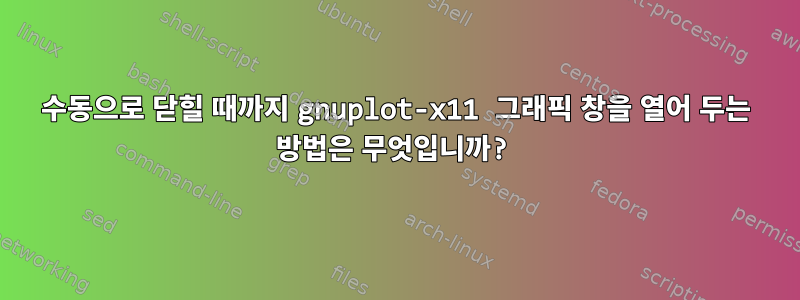
예를 들어, 다음은 gnuplot-x11키를 누를 때까지 그래픽 창을 열어 둡니다.
gnuplot -e "plot \"file\" ; pause -1 \"text\""
수동으로 닫을 때까지 열어 두는 방법은 무엇입니까?
답변1
사용 -p또는 --persist옵션:
gnuplot --persist -e 'plot sin(x)'
이렇게 하면 수동으로 닫힐 때까지 창이 열린 상태로 유지됩니다. ~에서매뉴얼 페이지:
-p, --persist lets plot windows survive after main gnuplot program
exits.
답변2
pause mouse close스크립트 마지막에 사용하는 것이 좋습니다 . 이를 통해 --persist또는 와 달리 추가 폴링 없이 마우스와 다양한 키 바인딩을 사용하여 도면을 제어할 수 있습니다 reread.
기본 키 바인딩에는 다음이 포함됩니다.
<B1> doubleclick send mouse coordinates to clipboard (pm win wxt x11)
<B2> annotate the graph using `mouseformat` (see keys '1', '2')
or draw labels if `set mouse labels is on`
<Ctrl-B2> remove label close to pointer if `set mouse labels` is on
<B3> mark zoom region (only for 2d-plots and maps)
<B1-Motion> change view (rotation); use <Ctrl> to rotate the axes only
<B2-Motion> change view (scaling); use <Ctrl> to scale the axes only
<Shift-B2-Motion> vertical motion -- change xyplane
<B3-Motion> change view (azimuth)
<wheel-up> scroll up (in +Y direction)
<wheel-down> scroll down
<shift-wheel-up> scroll left (in -X direction)
<shift-wheel-down> scroll right
<Control-WheelUp> zoom in on mouse position
<Control-WheelDown> zoom out on mouse position
<Shift-Control-WheelUp> pinch on x
<Shift-Control-WheelDown> expand on x
q * close this plot window
a `builtin-autoscale` (set autoscale keepfix; replot)
b `builtin-toggle-border`
e `builtin-replot`
g `builtin-toggle-grid`
h `builtin-help`
i `builtin-invert-plot-visibilities`
l `builtin-toggle-log` y logscale for plots, z and cb for splots
L `builtin-nearest-log` toggle logscale of axis nearest cursor
m `builtin-toggle-mouse`
r `builtin-toggle-ruler`
V `builtin-set-plots-invisible`
v `builtin-set-plots-visible`
1 `builtin-previous-mouse-format`
2 `builtin-next-mouse-format`
5 `builtin-toggle-polardistance`
6 `builtin-toggle-verbose`
7 `builtin-toggle-ratio`
n `builtin-zoom-next` go to next zoom in the zoom stack
p `builtin-zoom-previous` go to previous zoom in the zoom stack
u `builtin-unzoom`
+ `builtin-zoom-in` zoom in
= `builtin-zoom-in` zoom in
- `builtin-zoom-out` zoom out
Right `scroll right in 2d, rotate right in 3d`; <Shift> faster
Up `scroll up in 2d, rotate up in 3d`; <Shift> faster
Left `scroll left in 2d, rotate left in 3d`; <Shift> faster
Down `scroll down in 2d, rotate down in 3d`; <Shift> faster
< `rotate azimuth left in 3d`; <ctrl> faster
> `rotate azimuth right in 3d`; <ctrl> faster
Escape `builtin-cancel-zoom` cancel zoom region
답변3
플로팅 프로그램을 주기적으로 새로 고쳐 라이브 차트로 만들 수 있습니다. 이는 파일을 업데이트하는 데이터 로거와 함께 가장 일반적으로 사용됩니다.
하지만 귀하의 질문에 관한 한 줄거리는 열린 상태로 유지되며, 이는 귀하가 누를 때까지 상쾌합니다.Ctrl-C
그리기 프로그램 끝에 다음 두 줄을 추가하세요.
pause 30
reread
이것의 한 가지 장점은 특히 디버깅할 때 gnuplot 환경을 사용하기 위해 종료할 필요가 없다는 것입니다. 플로팅을 중지하면 gnuplot 프롬프트로 돌아갑니다. 여전히
!vi plotpgm.gpgnuplot 환경을 사용하여 프로그램을 편집한 다음load "plotpgm.gp명령을 사용하여 다시 시작할 수 있습니다.


